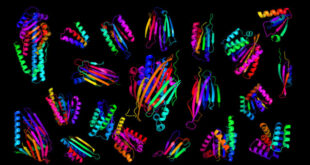The willow-leaved justicia (Justicia gendarussa), a medicinal plant found throughout Southeast Asia, contains a potent anti-HIV-1 compound more powerful than the clinically used drug azidothymidine (AZT), according to new research.
Zhang et al used the leaves’, stems’, and roots’ extract of the willow-leaved justicia (Justicia gendarussa).
Image credit: University of Illinois at Chicago.
The willow-leaved justicia, an evergreen plant mostly found in moist areas, is believed to be native to China and is distributed widely across India, Sri Lanka, and Malaysia.
In Indian and Chinese traditional medicine, the leaf of the plant is recommended to treat ailments such as fever, hemiplegia, rheumatism, arthritis, headache, earache, muscle pain, respiratory disorders, and digestive trouble.
The newly-identified chemical, patentiflorin A, has the ability to inhibit the reverse transcriptase (RT), an enzyme needed for HIV to incorporate its genetic code into a cell’s DNA.
The compound was identified in a screening of more than 4,500 plant extracts for their effect against the HIV virus.
The first anti-HIV drug, AZT (also known as zidovudine) was developed and approved in 1987. It inhibits the RT enzyme and remains the cornerstone of HIV drug cocktails today.
“Patentiflorin A represents a novel anti-HIV agent that can be added to the current anti-HIV drug cocktail regimens to increase suppression of the virus and prevention of AIDS,” said lead co-author Lijun Rong, professor of microbiology and immunology in the College of Medicine at the University of Illinois at Chicago.
In studies of human cells infected with the HIV virus, patentiflorin A had a much more significant inhibition effect on the RT enzyme.
“Patentiflorin A was able to inhibit the action of RT much more effectively than AZT, and was able to do this both in the earliest stages of HIV infection when the virus enters macrophage cells, and alter infection when it is present in T cells of the immune system,” Prof. Rong said.
“It also was effective against known drug-resistant strains of the HIV virus, making it a very promising candidate for further development into a new HIV drug.”
Prof. Rong and co-authors from the University of Illinois at Chicago, Hong Kong Baptist University, and the Vietnam Academy of Science and Technology, were also able to synthesize patentiflorin A.
“If we can make the drug in the lab, we don’t need to establish farms to grow and harvest the plant, which requires significant financial investment, not to mention it has an environmental impact,” Prof. Rong said.
The study was published this week in the Journal of Natural Products.
_____
Hong-Jie Zhang et al. Potent Inhibitor of Drug-Resistant HIV-1 Strains Identified from the Medicinal Plant Justicia gendarussa. J. Nat. Prod, published online June 14, 2017; doi: 10.1021/acs.jnatprod.7b00004
 #Bizwhiznetwork.com Innovation ΛI |Technology News
#Bizwhiznetwork.com Innovation ΛI |Technology News




